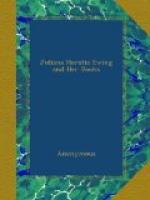I cannot tell you how it pleases me that you liked the bit about Aldershot in “Laetus.” I hope that it must have grated very much if I had done it badly or out of taste, on any one who knows it as well as you do; and that its moving your sympathies does mean that I have done it pretty well. I cannot tell you the pains I expended on it! All those sentences about the Camp were written in scraps and corrected for sense and euphony, etc., etc., bit by bit, like “Jackanapes"!!! Did I tell you about “Tuck of Drum”? Several people who saw the proof, pitched into me, “Never heard of such an expression.” I was convinced I knew it, and as I said, as a poetical phrase; but I could not charge my memory with the quotation: and people exasperated me by regarding it as “camp slang.” I got Miss S. to look in her Shakespeare’s Concordance, but in vain, and she wrote severely, “My Major lifts his eyebrows at the term.” I was in despair, but I sent the proof back, trusting to my instincts, and sent a postcard to Dr. Littledale, and got a post-card back by return—“Scott”—“Rokeby.”
“With burnished brand
and musketoon,
So gallantly you
come,
I rede you for a bold dragoon,
That lists the
tuck of drum.”—
“I list no more the
tuck of drum,
No more the trumpet
hear;
But when the beetle sounds
his hum,
My comrades take
the spear.”
And I copied this on to another postcard and added, Tell your Major! and despatched it to Miss S.! She said, “You did Cockadoodle!”—
But isn’t it exquisite? What a creature Scott was! Could words, could a long romance, give one a finer picture of the ex-soldier turned “Gentleman of the Road”? The touch of regret—“I list no more the tuck of drum,” and the soldierly necessity for a “call”—and then such a call!
When the Beetle sounds his hum—
The Dor Beetle!—
I hope you will like the tale as a whole. It has been long in my head.
* * * * *
Oh! how funny Grossmith was! Yesterday I was at the Matinee for the Dramatic School, and he did a “Humorous Sketch” about Music, when he said with care-carked brows that there was only one man’s music that thoroughly satisfied him (after touching on the various schools!)—and added—“my own.” It was inexpressibly funny. His “Amateur Composer” would have made you die!
Ah, but THE treat, such a treat as I have not heard for years—was that old Ristori RECITED the 5th Canto of the Inferno. I did not remember which it was, and feared I should not be able to follow, but it proved to be “Francesca.” Never could I have believed it possible that reciting could be like that. I could have gone into a corner and cried my heart out afterwards, the tension was so extreme. And oh what power and WHAT refinement!




